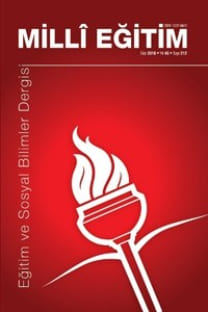Bir Okulun Kurumsal Hafızası Okulun Öğrencilerine Neler Katabilir?
okul, kurumsal hafıza, kültürel birikim, dijital arşiv, teknoloji, nesiller arası aktarım
What Can a School's Corporate Memory Contribute to the School's Students?
school, corporate memory, history, digital archive, technology, intergenerational transfer,
___
- Ada, Ş. ve Akan, D. (2007). Değişim sürecinde etkili okullar. Atatürk Üniversitesi Kâzım Karabekir Eğitim Fakültesi Dergisi, 0(16), 343-373. https://dergipark.org.tr/en/pub/ataunikkefd/issue/2777/37246
- Akıncı Vural, Z. ve Erkan, M. (2018). Kurumsal imajın güçlendirmesinde kurumsal kimliğin rolü. SDÜ İFADE, 1(1), 9-41. https://dergipark.org.tr/tr/pub/sduifade/issue/45410/569761
- Al, U. ve Soydal, İ. (2014). Kütüphan-e Türkiye Projesi: halk kütüphanesi kullanım araştırması. Türk Kütüphaneciliği, 28, 288-307. http://www.tk.org.tr/index.php/TK
- Ata, B. (2011). Sosyal bilgiler eğitiminde iyi bir örnek: ABD kongre kütüphanesinin Amerikan hafıza projesi. Türk Kütüphaneciliği, 25(2), 261-270. https://dergipark.org.tr/tr/pub/tk/issue/48855/622445
- Balcı, A. (2013). Etkili okul ve okul geliştirme kuram uygulama ve araştırma. Pegem Akademi Yayıncılık.
- Bencsik, A., Lore, V. ve Marosi, I. (2009, Ağustos). From individual memory to organizational memory (intelligence of organizations) [Oral presentation]. World Academy of Science, Engineering and Technology Conference, 56, 1-6.
- Biletska, Y., Şahin, C. ve Şükür, İ. (2014). Kolektif hafıza ve milli kimlik bağlamında Türkiye’de resmi tarih yazıcılığı. İnsan ve Toplum Bilimleri Araştırmaları Dergisi, 3(1), 94- 116. https://doi.org/10.15869/itobiad.14906
- Brooking, A. (1998). Corporate memory: strategies for knowledge management. International Thomson Publishing.
- Bursa MEB (2019, 12 Mayıs). E-PAS Öğretmenler arası 1 fikir proje yarışması. EBA. https://www.eba.gov.tr/haber/1550227525
- Chang, D.R. ve Cho, H. (2008). Organizational memory influences new product success. Journal of Business Research, 61, 13-23.
- Cheng, Y. C. (1996). School effectiveness and school-based management: a mechanism for development. Falmer Press.
- Cyert, R.M. ve March, J.G. (1963). Firmanın davranış teorisi. Prentice-Hall.
- Çalık, M. ve Sözbilir, M. (2014). İçerik analizinin parametreleri [Parameters of content analysis]. Eğitim ve Bilim, 39(174), 33-38.
- Çetintaş, H. (2014). Bir kurumsal iletişim stratejisi olarak kurumsal bloglar. Selçuk İletişim, 8(9), 92-121. https://dergipark.org.tr/tr/pub/josc/issue/19029/201040
- Dalkir, K. ve Keller, M. (2004, Haziran). Putting knowledge to work in an educational setting: the second start school project. 95th Annual SLA (Special Libraries Association) Conference [Oral presentation]. Nashville, Tennessee.
- Deal, T. E. ve Peterson, K. D. (2010). Shaping school culture: pitfalls, paradoxes, and promises. John Wiley & Sons.
- Dinçer, S. (2018). Content analysis in scientific research: meta-analysis, meta-synthesis, and descriptive content analysis. Bartın University Journal of Faculty of Education, 7 (1), 176-190. https://doi.org/10.14686/buefad.363159
- Eren, F. (2016). The re-specification of concepts in the morphogenetic approach for property market research. ICONARP International Journal of Architecture and Planning, 4(2), 15–34. https://doi.org/10.15320/ICONARP.2016.9
- Gay, G. (2018). Culturally responsive teaching: theory, research, and practice. Teachers College Press.
- Gruenert, S. ve Whitaker, T. (2015). School culture rewired: how to define, assess, and transform it. ASCD.
- Kaplan, F. (2008). Anadolu liselerinin etkili okul olma özelliklerini karşılama düzeyi. Yüksek Lisans Tezi, Ankara Gazi Üniversitesi Eğitim Bilimleri Enstitüsü, Ankara
- Karatepe, S. ve Ozan, M. (2017). Kurumsal sosyal sorumluluk ve kurumsal itibar ilişkisi üzerine bir değerlendirme. Akademik Yaklaşımlar Dergisi, 8(2), 80-101. https://dergipark.org.tr/tr/pub/ayd/issue/33600/372885
- Kemp, S. E., Ng, M., Hollowood, T. ve Hort, J. (2018). Introduction to descriptive analysis. Descriptive Analysis in Sensory Evaluation, 1-39.
- Leithwood, K. ve Louis, K. S. (2021). Organizational learning in schools. Taylor & Francis.
- Linde, C. (2009). Working the past: narrative and institutional memory. Oxford University Press.
- Lomograhpy (2019, 21 October). Thomas Edison and the kinetoscope. https://www.lomography.com.tr/magazine/112686-thomas-edison-and-the-kinetoscope
- Marangoz, M. ve Biber, L. (2007). Kurumsal imajın ve kurumsal ünün müşteri bağlılığına etkileri. Karamanoğlu Mehmetbey Üniversitesi Sosyal ve Ekonomik Araştırmalar Dergisi, 2, 173-193. https://dergipark.org.tr/tr/pub/kmusekad/issue/10223/125681
- Melgar, A. ve Corro, L. (2016). A framework for organizational memory management of research projects in institutions of higher education. 11th Iberian Conference on Information Systems and Technologies (CISTI) [Oral presentation]. 1-5. https://ieeexplore.ieee.org/document/7521509
- Mert, G. (2017). Kurumsal Hafıza. Artikel Yayıncılık.
- Özhan, E. (2017). Kurumsal hafızanın korunmasında sistemin önemi. Arşiv Dünyası, (18-19), 1-10. https://dergipark.org.tr/tr/pub/ad/issue/33457/372342
- Quaglia, R. (1989). Student aspirations: a critical dimension in effective schools. Research in Rural Education, 6(2), 7-9.
- Rowlinson, M., Booth, C., Clark, P., Delahaye, A. ve Procter, S. (2010). Social remembering and organizational memory. Organization Studies, 31(1), 69-87.
- Schoen, L. T. ve Teddlie, C. (2008). A new model of school culture: a response to a call for conceptual clarity. School Effectiveness and School Improvement, 19(2), 129-153.
- Seçkin Halaç, D. ve Seçkin Çelik, T. (2016). Örgütsel hafıza ve yenilikçi iş davranışı ilişkisinde hikâye anlatımının aracı rolü. Galatasaray Üniversitesi İletişim Dergisi, 25, 261- 285. https://doi.org/10.16878/gsuilet.283074.
- Şahin, M. (2013). Okul kültürünün bir ögesi olarak okul törenleri. Milli Eğitim Dergisi, 43(199), 169-185. https://dergipark.org.tr/tr/pub/milliegitim/issue/36166/406552
- Şenel, T. ve Buluç, B. (2016). İlkokullarda okul iklimi ile okul etkililiği arasındaki ilişki. TÜBAV Bilim Dergisi, 9(4), 1-12. https://dergipark.org.tr/tr/pub/tubav/issue/24727/261489
- Tekin, F. (2019). Hafıza ortamından tüketim nesnesine dönüşen ev. Sosyal ve Kültürel Araştırmalar Dergisi (SKAD), 5(11), 253-273.
- Uslu, A. (2016). Hafıza ve geçmişin talebi olarak tarih arasındaki ayrım. ViraVerita E-Dergi, 3, 42-64. https://dergipark.org.tr/tr/pub/viraverita/issue/22436/240088
- Valentin, B. (2019, 9 July). Discover peephole cinema, the smallest theater in NYC located in Bushwick, Brooklyn. Untapped Newyork. https://untappedcities.com/2019/05/07/peephole-cinema-the-smallest-theater-in-nyc/
- ISSN: 1302-5600
- Yayın Aralığı: Yılda 4 Sayı
- Başlangıç: 1973
- Yayıncı: Milli Eğitim Bakanlığı
Sevgi COŞKUN KESKİN, Elif İÇÖZ ARSLAN
Resimli Hikâye Kitaplarının Fiziksel, İçerik ve Resimleme Özelliklerinin İncelenmesi
Akif AKTO, Ela KIRAN ÖLMEZ, Recep BİNDAK
Pandemi Döneminde Üniversite Öğrencilerinin İyilik Halleri
Fidan KORKUT OWEN, Deniz ALBAYRAK KAYMAK
Sanatta Kültürel Simgeler: Zeytin Ağacı
Mücahit DURMAZ, Abdurrahman Baki TOPÇAM, Muhammet SÖNMEZ, Zeliha Nurdan BAYSAL
Doğukan ERCOŞKUN, Nimet Remziye ERGÜL
Zeynep ERTAŞ KARAASLAN, Fitnat KAPTAN
